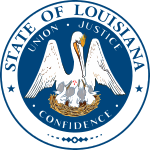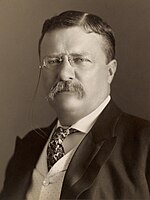| ||||||||||||||||||||||||||
| ||||||||||||||||||||||||||
 Parish Results
Parker 60-70% 70-80% 80-90% 90-100%
| ||||||||||||||||||||||||||
| ||||||||||||||||||||||||||
| Elections in Louisiana |
|---|
 |
|
|
The 1904 United States presidential election in Louisiana took place on November 8, 1904. All contemporary 45 states were part of the 1904 United States presidential election. State voters chose nine electors to the Electoral College, which selected the president and vice president.
Following the overthrow of Reconstruction Republican government, Louisiana, like most of the former Confederacy, established a Democratic-dominated but highly fraudulent political system[1] that would from 1890 be challenged by the rise of the Populist Party due to declining conditions for farmers. Both the Populists and the earlier Greenback Party — who shared key leaders like James B. Weaver — would be supported by the state Republican Party,[2] and in the 1896 gubernatorial election a fusion candidate was undoubtedly denied by the continued fraud.[3] Consequently, the state’s plantation elite radically rewrote the state’s constitution in the next gubernatorial term with a poll tax, literacy test, grandfather clause, and a secret ballot. The consequence was a reduction in the number of registered black voters by 96 percent,[4] and virtual elimination of black voting in Acadiana until the 1950s.[a]
Louisiana consequently became a one-party state dominated by the Democratic Party, as the now-moribund Republican party lacked any white base because Louisiana completely lacked upland or German refugee whites opposed to secession.[7] After 1900, not until 1964 would another Republican serve in the state legislature.[8]
Despite this absolute single-party dominance, non-partisan tendencies remained strong among wealthy sugar planters in Acadiana, within the business elite of New Orleans,[9] and even amongst the “lily-white” “National Republican” GOP faction who supported black disenfranchisement in an effort to become respectable amongst the white elite.[10] State politics became controlled by the Choctaw Club of Louisiana, generally called the “Old Regulars”. This political machine was based in New Orleans and united with Black Belt cotton planters.[11] Although white Republicans continued to work towards taking over Federal patronage from the “black and tans”, throughout most of the 1900s Louisiana politics was under firm Choctaw control as the Populist movement weakened with the disenfranchisement of many poor whites via the poll tax.[10]
Louisiana was won by the Democratic nominees, Chief Judge Alton B. Parker of New York and his running mate Henry G. Davis of West Virginia. They defeated the Republican nominees, incumbent President Theodore Roosevelt of New York and his running mate Charles W. Fairbanks of Indiana. Parker won the state by a landslide margin of 78.84%.
With 88.5 percent of the popular vote, Louisiana would be Parker's third strongest victory in terms of percentage in the popular vote after South Carolina and neighboring Mississippi.[12]
- ^ Hair, William Ivy (1969). Bourbonism and agrarian protest; Louisiana politics, 1877-1900. pp. 114–115. ISBN 0807109088.
- ^ Kousser, J. Morgan (1975). The Shaping of Southern Politics: Suffrage Restriction and the Establishment of the One-Party South, 1880-1910 (Second Printing ed.). New Haven, Connecticut: Yale University Press. p. 25. ISBN 0-300-01973-4.
- ^ Kousser. The Shaping of Southern Politics, p. 41
- ^ Lewinson, Paul (1965). Race, class and party; a history of Negro suffrage and white politics in the South. New York City: Grosset & Dunlap. p. 81.
- ^ See Howard, Perry H. (1954). "A New Look at Reconstruction". Political Tendencies in Louisiana, 1812-1952; An Ecological Analysis of Voting Behavior (Thesis). LSU Historical Dissertations and Theses. pp. 112–113. OCLC 8115.
- ^ Subcommittee No. 5 (1965). 1965 Voting Rights Act (Report). Committee on the Judiciary, United States House of Representatives. pp. 4, 139–201.
{{cite report}}: CS1 maint: numeric names: authors list (link) - ^ Phillips, Kevin P. The Emerging Republican Majority. pp. 208, 210. ISBN 9780691163246.
- ^ Kang, Michael S. (May 29, 2019). "Hyperpartisan Gerrymandering". Boston College Law Review. 69: 1395.
- ^ Schott, Matthew J. (Summer 1979). "Progressives against Democracy: Electoral Reform in Louisiana, 1894-1921". Louisiana History: The Journal of the Louisiana Historical Association. 20 (3): 247–260.
- ^ a b Heersink, Boris; Jenkins, Jeffrey A. Republican Party Politics and the American South, 1865-1968. pp. 265–266. ISBN 1107158435.
- ^ Wall, Bennett H.; Rodriguez, John C. Louisiana: A History. pp. 274–275. ISBN 1118619293.
- ^ "1904 Presidential Election Statistics". Dave Leip’s Atlas of U.S. Presidential Elections. Retrieved March 5, 2018.
Cite error: There are <ref group=lower-alpha> tags or {{efn}} templates on this page, but the references will not show without a {{reflist|group=lower-alpha}} template or {{notelist}} template (see the help page).
© MMXXIII Rich X Search. We shall prevail. All rights reserved. Rich X Search


